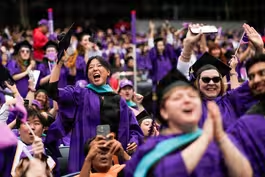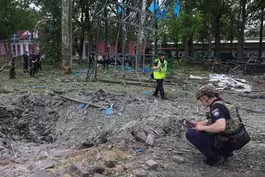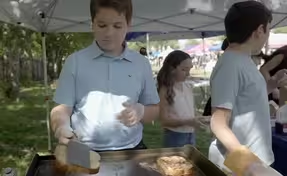
Thousands celebrate LGBTQ+ community in nation's capital
Clip: 6/7/2025 | 6m 17sVideo has Closed Captions
Global celebration of LGBTQ+ community draws thousands to nation's capital
LGBTQ+ people from around the globe gathered in Washington, D.C. Saturday to celebrate Pride Month and protest the Trump administration’s recent targeting of their community. A rally will take place Sunday against health research funding cuts in areas like gender-affirming care, HIV and AIDs. One of those impacted, Brian Mustanski, director of the Impact Institute, joins Ali Rogin to discuss.
Problems playing video? | Closed Captioning Feedback
Problems playing video? | Closed Captioning Feedback
Major corporate funding for the PBS News Hour is provided by BDO, BNSF, Consumer Cellular, American Cruise Lines, and Raymond James. Funding for the PBS NewsHour Weekend is provided by...

Thousands celebrate LGBTQ+ community in nation's capital
Clip: 6/7/2025 | 6m 17sVideo has Closed Captions
LGBTQ+ people from around the globe gathered in Washington, D.C. Saturday to celebrate Pride Month and protest the Trump administration’s recent targeting of their community. A rally will take place Sunday against health research funding cuts in areas like gender-affirming care, HIV and AIDs. One of those impacted, Brian Mustanski, director of the Impact Institute, joins Ali Rogin to discuss.
Problems playing video? | Closed Captioning Feedback
How to Watch PBS News Hour
PBS News Hour is available to stream on pbs.org and the free PBS App, available on iPhone, Apple TV, Android TV, Android smartphones, Amazon Fire TV, Amazon Fire Tablet, Roku, Samsung Smart TV, and Vizio.
Providing Support for PBS.org
Learn Moreabout PBS online sponsorshipJOHN YANG: Good evening.
Iúm John yang in Washington, D.C. Thousands of LGBTQ people and their allies are gathered to celebrate World Pride and protest the Trump administrationús actions targeting their rights and protections.
Today, the emphasis was on celebrating a joyful WorldPride parade through the city.
JOHN YANG (voice-over): In Logan Circle, one of the centers of LGBTQ Life in Washington, D.C., marchers lifted a huge 1,000 foot long rainbow flag near the front of todayús Pride parade.
Orange is the new black actor Laverne Cox, a staunch advocate for queer rights, waving to the crowds lining the route.
This is the final weekend of WorldPride, an international festival promoting visibility and awareness of the community.
Itús the first time the event has been held in Washington, now ground zero in the struggle for LGBTQ rights.
President Trump has rolled back Biden era policies recognizing non-binary people and protecting gender affirming care.
The nearly two-mile long parade route ended on Pennsylvania Avenue about midway between the White House and the Capitol, where there were calls for continuing the push for LGBTQ rights.
JOHN YANG: Tomorrow there is to be a rally at the Lincoln Memorial and a march to the Capitol to protest the Trump administrationús actions to affecting the LGBTQ community, like cutting funding for health research.
Many researchers in areas like gender affirming care and HIV AIDS have lost federal grants.
One of them is Brian Mustanski, Director of the Impact Institute for LGBTQ Health Research at Northwestern University.
He spoke with Ali Rogin.
ALI ROGIN: Dr. Mustanski, thank you so much for being with us.
Your work has benefited from funding from the National Institutes of Health for years.
You shared with us one of the termination notices you received in March from them.
They said, quote, the award no longer effectuates agency priorities.
And they called it a DEI study that supports unlawful discrimination.
Tell us about the work youúve been doing and how has it been impacted by this loss in funding.
DR. BRIAN MUSTANSKI, Northwestern University: Yeah.
So the particular study that you mentioned, we call the Radar Project, and itús really one of a kind of project where we have enrolled a group of young gay men in Chicago and have been following some of them for over 20 years to look at how early life experiences predict a variety of different health outcomes, most specifically HIV, substance use, overdose, suicide, mental health, a variety of health issues that we know disproportionately impact that group of young men.
And the goal of that study is to really follow them over time.
Itús kind of like the Framingham Heart Study that youúve probably heard of that helped us understand the predictors of cardiovascular disease in the general population.
This project is specifically focused on the health of young gay men, a group that we know has the highest rate of HIV in our country.
ALI ROGIN: Why is it so important to have these studies that arenút just snapshots of a moment in time?
Youúre talking tracking the same people over decades.
Why is that such essential work?
BRIAN MUSTANSKI: Yeah, well, I mean, really, the only way you can predict something is to observe it before or after it happens.
And so thatús why itús so important for us to conduct these kinds of studies that follow people over time.
Theyúre really the backbone of epidemiology and understanding what truly predicts the health outcomes in a particular population.
And just I want to add that, you know, while the termination notice described this as DEI, it really has nothing to do with the diversity of the workforce.
Itús not some kind of radical ideology that weúre pushing.
Weúre really doing fundamental, high quality research that helps us understand the health of a group that has a lot of unfortunately disproportional health outcomes in our society.
ALI ROGIN: And it is Pride Month.
And I wonder, what is your assessment on a broader level of the state of the health of people in the LGBTQ community right now?
BRIAN MUSTANSKI: I think itús a scary time for people in the community.
You know, as a scientist, I can say that over the last decade, weúve seen impressive gains under different administrations of different political parties that have supported the growth of science that can help us document the disparities experienced in our community and even more recently, actually start moving to develop interventions and programs that improve the health of LGBTQ Americans.
So we have really, at this formative moment where there is now a community of scientists who are ready to apply these skills to the health of LGBT Americans and are having their work decimated by NIH cuts.
And these cuts are really unprecedented.
So in a normal year, the NIH might terminate a very small number, maybe less than a dozen NIH grants in a year.
Just this year alone, theyúve terminated over 300 grants focused on LGBT health.
And these grants are really the cream of the crop science.
It is a very competitive process to win an NIH grant, you have to write a very competitive application, a well designed study.
It has to be of high public health importance.
It goes through a peer review process.
It goes through review of a council that determines that itús aligned with the research priorities of the NIH.
Only then about 15 percent of grants are awarded.
And so this is really the cream of the crop science that went through this highly competitive process.
And many of these studies were right in the middle of being conducted.
Some had randomized people to interventions and were following them to see if those interventions were effective and were immediately terminated.
So we wonút have those answers to whether these programs are effective or not.
ALI ROGIN: Brian Mustanski, Director of the Impact Institute for LGBTQ Health Research at Northwestern University, thank you so much.
BRIAN MUSTANSKI: Thanks for having me.
How AI may be robbing college graduates of traditional jobs
Video has Closed Captions
Clip: 6/7/2025 | 5m 27s | How AI may be robbing new college graduates of traditional entry-level jobs (5m 27s)
News Wrap: Russian attacks kill 4 people in Ukraine
Video has Closed Captions
Clip: 6/7/2025 | 4m 17s | News Wrap: Russian attacks kill 4 people in Ukraine (4m 17s)
Texas school finds valuable classroom inside a food truck
Video has Closed Captions
Clip: 6/7/2025 | 4m 44s | Texas school finds valuable classroom inside a food truck (4m 44s)
Providing Support for PBS.org
Learn Moreabout PBS online sponsorshipSupport for PBS provided by:
Major corporate funding for the PBS News Hour is provided by BDO, BNSF, Consumer Cellular, American Cruise Lines, and Raymond James. Funding for the PBS NewsHour Weekend is provided by...














